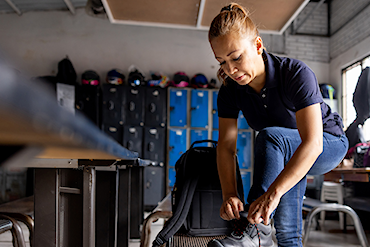-

Expert tips
Meeting marathons and email chaos – create structure in your workday
In today's connected work life, many struggle to structure their workday. The constant stream of digital communication and meetings makes it challenging to find time for focused work and to balance different tasks. Putting your day together can feel simple in theory, but for many it is difficult to achieve.
-

Health tips
Reduce sedentary behaviour – tips for more movement in everyday life
In today's work life, many of us spend a large part of the day sedentary. Not moving regularly during the day has been shown to have negative effects on health, among other things, it increases the risk of cardiovascular diseases and strain injuries. Here we share tips on how you can incorporate more movement during a workday.
-

Expert tips
Better recovery with mental training
Many feel stressed at work. By learning how the body reacts to different situations, we can increase our well-being. With good mental fitness, we can find the balance between stress and recovery.
-
Health tips
Create time for recovery during the working day
Stress and high pace characterise many workdays, but small breaks for recovery can make a big difference to both health and productivity.
Expert tips
Hybrid work – great opportunity but tricky balancing act
Working from home has made things easier for many. However, according to Falck's latest survey, we see that remote work is not entirely positive—at least not if it occurs too extensively. Lena-Karin Allinger and Åsa Miemois, who work at Falck, emphasize the importance of dialogue and balance to manage the risks and promote the positive aspects of the flexible working approach.
-

Expert tips
Safe and sustainable rehab after burnout
Security, clarity, and predictability are key principles for a successful return to work during sick leave due to stress and exhaustion. Creativity and flexibility are also valuable for finding the right balance and adapting work to match energy levels during rehabilitation.
-

Psychological first aid makes mental health talkable
What exactly is mental illness and where is the line between feeling down for a while and having to seek help? How do we recognize mental illness in others and in ourselves? Knowing psychological first aid creates security in the workplace and reduces the stigma around not feeling well.
-

Expert tips
Build resilience and protect yourself against viruses
Many viruses and colds are circulating, and it is not always possible to prevent getting sick, but we can do a lot to prevent infection and keep up our energy.
-

Expert tips
A psychologist’s tips for dealing with worry
There are many things going on around us that can cause us worry, stress or anxiety. What can we do when our worries grow too big and start to affect our everyday lives? We have spoken to psychologist Karin Calissendorff for some advice on how to deal with worries and stress.
-

Insights for a sustainable work life 2025
Sustainability in an era of AI and digitalization, focus on young people in the work live, and double grant for rehabilitation support – these are some of the insights for the work life in 2025 shared by our experts at Falck.